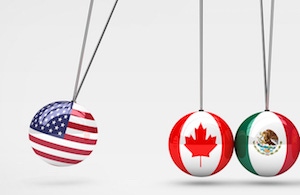NAFTA in the time of Trump
Donald Trump may win his fight to change or cancel the North American Free Trade Agreement (NAFTA), but it is not going to create many new jobs for Americans.
July 1, 2017

Donald Trump may win his fight to change or cancel the North American Free Trade Agreement (NAFTA), but it is not going to create many new jobs for Americans. Much has changed in the 23 years since NAFTA came into effect. Low-skilled and high-labor-content jobs were sent to Mexico and China to take advantage of the low-cost environment. But the jobs needed in American advanced manufacturing today are fewer and very different than they were when companies headed south to Mexico and west to China in the 1990s and 2000s.
|
Returning manufacturing to anywhere in the United States is likely to provide opportunities for manufacturers to modernize factories and automate production, thereby reducing operating costs, enhancing productivity and, ultimately, requiring far fewer workers. Today’s manufacturing jobs require a host of new skills and technologies. Workers will have to be retrained for advanced skills, such as 3D printing, running computerized and sophisticated machine tools and operating robots. These advanced manufacturing skills will provide higher pay for workers, but fewer jobs.
This is not your grandfather’s manufacturing, and America is not a low-cost manufacturing environment. Manufacturing that is coming back to America is much more efficient and technologically advanced.
If the NAFTA treaty is to be rescinded, as Trump has indicated he wants to do, the United States would be free to increase tariff rates on imports, presumably to make manufacturing in the United States seem more cost-competitive and to protect American jobs.
But import tariffs only mask the true problem and allow companies to get lazy about becoming cost-efficient and more productive. Instead of focusing on productivity improvements and cost cutting, manufacturers wouldn’t have to do things much differently to compete with tariff-laden, higher-priced imports. Prices are likely to increase across the board on imports of raw materials, subassemblies and consumer goods. As a result, U.S. consumers will have to pay more for imported goods on par with the cost of American-made goods. The consumer loses both ways.
Another Smoot-Hawley?
Trump claims that NAFTA has caused the loss of countless jobs to lower-cost environments in Mexico, and that these jobs will all come back in a post-NAFTA trade environment. He urges that, instead of doing nothing, the United States should take every opportunity to raise all import tariffs, eliminate trade agreements and close the borders to immigrants and trade.
But we have been down this road before with the Smoot-Hawley Tariff Act of 1930, which raised tariffs on about 900 products. Historians blame Smoot-Hawley for triggering the Great Depression of the 1930s. They point out that Smoot-Hawley caused sharp increases in consumer prices, which led to consumers buying fewer products, which in turn led to low demand, lay-offs, high unemployment and, ultimately, the stock market crash.
For sure, NAFTA has its problems. The import/export paperwork required to track goods moving across the borders and the associated record-keeping can be onerous. Special rules for truckers from Mexico have taken a toll on American truckers, and the effects don’t end there. But overall, most economists think NAFTA has been a net positive for the U.S. economy.
Trade wars
Another concern is the likelihood of trade wars with Mexico, Canada and other countries. If tariffs are raised on imports to the United States, or if the proposed Border Adjustment Tax is imposed, our trading-partner countries are likely to raise tariffs on imports coming into their countries. (The Border Adjustment Tax, proposed by House Speaker Paul Ryan, would apply a tax on all goods imported to the United States, which would, in turn, cause price increases for U.S. consumers.)
Take fruits and vegetables, for example. Mexico provides 70% of the fresh fruits and vegetables consumed in the United States; more than six billion pounds were imported from Mexico from 2015 to 2016. Corn and soybeans from American farms move in the other direction into Mexico. If a tariff is placed on fruits and vegetables from Mexico, and Mexico retaliates with a tariff of its own on American corn and soybeans, American consumers will suffer from higher prices, and American farmers will find it difficult to compete for business in Mexico.
What’s next?
At the Reshoring Institute we are all about helping to bring jobs back to America, but radical import tariff increases and renegotiation of NAFTA or outright withdrawal from the treaty could cause much turbulence in the U.S. economy. Rescinding NAFTA is unlikely to improve heartland and rust-belt manufacturing jobs that Trump has promised voters he would bring back. What jobs might be saved or returned are liked to be highly skilled, high-tech jobs for which many out-of-work Americans are not prepared.
And the turbulence doesn’t stop there. Americans will likely end up paying more for everything coming from Mexico and Canada or for goods manufactured in higher-cost American factories. Buckle your seatbelts. The turbulence is just ahead.
Rosemary Coates, who authored this article, is the Executive Director of the Reshoring Institute, a 501c3 non-profit in collaboration with the University of San Diego. She is an Amazon.com best-selling author of five books, including The Reshoring Guidebook and Legal Blacksmith – How to Avoid and Defend Supply Chain Disputes. Coates earned an MBA from the University of San Diego and a BS in business logistics from Arizona State University. She has been a management consultant for 25 years, helping more than 80 global supply chain clients. She serves on the Board of Directors of the University of San Diego Supply Chain Management Institute and teaches global supply chain strategy at UC Berkeley. She is passionate about bringing manufacturing back to America.
www.ReshoringInstitute.org
About the Author(s)
You May Also Like



